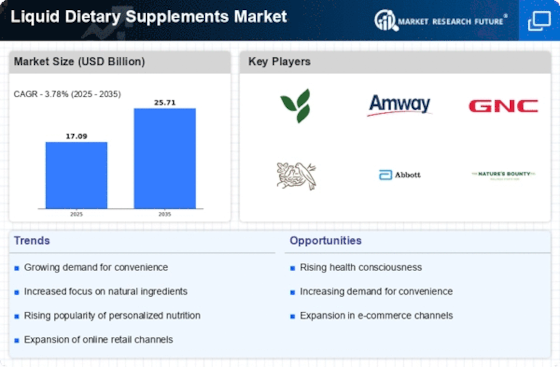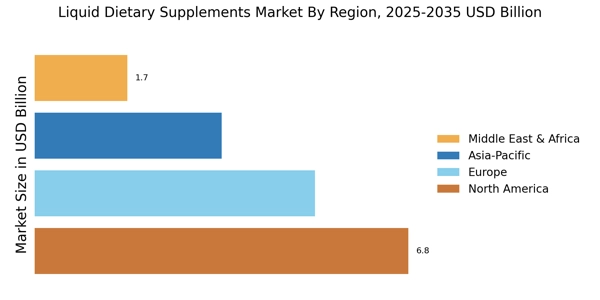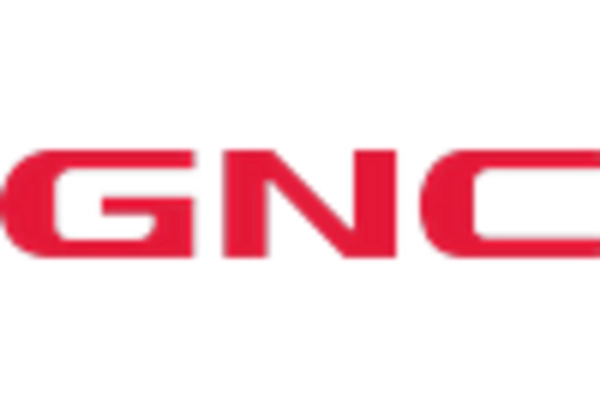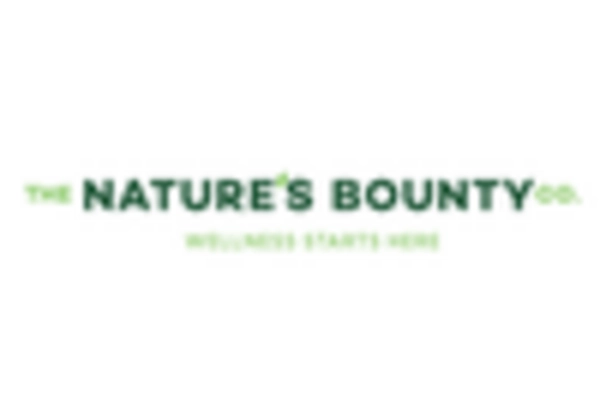Aging Population
The demographic shift towards an aging population is likely to have a profound impact on the Liquid Dietary Supplements Market. As individuals age, they often seek nutritional support to address various health concerns, including joint health, cognitive function, and cardiovascular health. This demographic trend is driving the demand for liquid dietary supplements that are formulated to meet the specific needs of older adults. Market data suggests that the segment targeting seniors is expected to witness substantial growth, with an increasing number of products being developed to cater to this audience. The aging population's focus on maintaining health and vitality is a crucial factor influencing the Liquid Dietary Supplements Market.
Rising Demand for Convenience
The fast-paced lifestyle of consumers today is driving the demand for convenience in dietary supplements, particularly in the Liquid Dietary Supplements Market. Busy individuals are increasingly looking for easy-to-consume options that fit seamlessly into their daily routines. Liquid supplements offer a practical solution, as they can be consumed on-the-go and often require no preparation. This trend is reflected in the growing popularity of ready-to-drink formulations and single-serving packages. Market data indicates that convenience-oriented products are experiencing a surge in sales, suggesting that manufacturers who prioritize ease of use are likely to capture a larger share of the Liquid Dietary Supplements Market.
Innovative Product Development
Innovation in product formulation and delivery methods is a key driver for the Liquid Dietary Supplements Market. Manufacturers are increasingly investing in research and development to create unique and effective liquid supplements that cater to diverse consumer needs. This includes the incorporation of functional ingredients, such as adaptogens and probiotics, which are gaining popularity for their health benefits. The introduction of new flavors and formulations is also enhancing consumer appeal. Market analysis indicates that the segment of innovative liquid dietary supplements is expanding rapidly, with a notable increase in new product launches. This trend underscores the importance of continuous innovation in sustaining growth within the Liquid Dietary Supplements Market.
Increasing Health Consciousness
The rising awareness of health and wellness among consumers appears to be a primary driver for the Liquid Dietary Supplements Market. Individuals are increasingly seeking products that support their overall health, boost immunity, and enhance physical performance. This trend is reflected in the growing demand for liquid supplements, which are perceived as more effective and easier to consume than traditional forms. According to recent data, the market for liquid dietary supplements is projected to grow at a compound annual growth rate of approximately 8% over the next five years. This shift towards health-conscious choices indicates a significant opportunity for manufacturers to innovate and cater to the evolving preferences of consumers in the Liquid Dietary Supplements Market.
Expansion of Distribution Channels
The expansion of distribution channels is a significant driver for the Liquid Dietary Supplements Market. With the rise of e-commerce and online retail platforms, consumers now have greater access to a wide variety of liquid dietary supplements. This shift in purchasing behavior is facilitating market growth, as consumers can easily compare products and make informed choices from the comfort of their homes. Additionally, traditional retail channels are also adapting by increasing their offerings of liquid supplements. Market trends indicate that the accessibility of these products through multiple channels is likely to enhance consumer reach and drive sales in the Liquid Dietary Supplements Market.

















